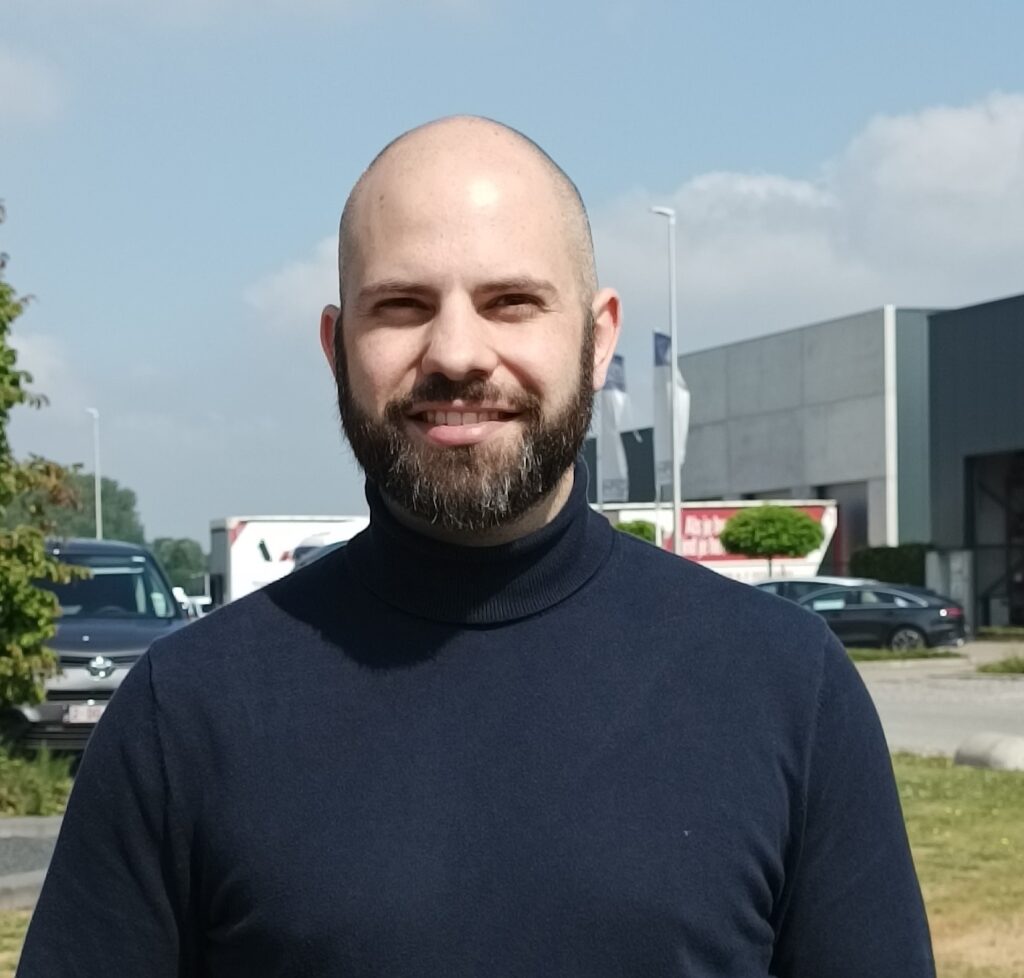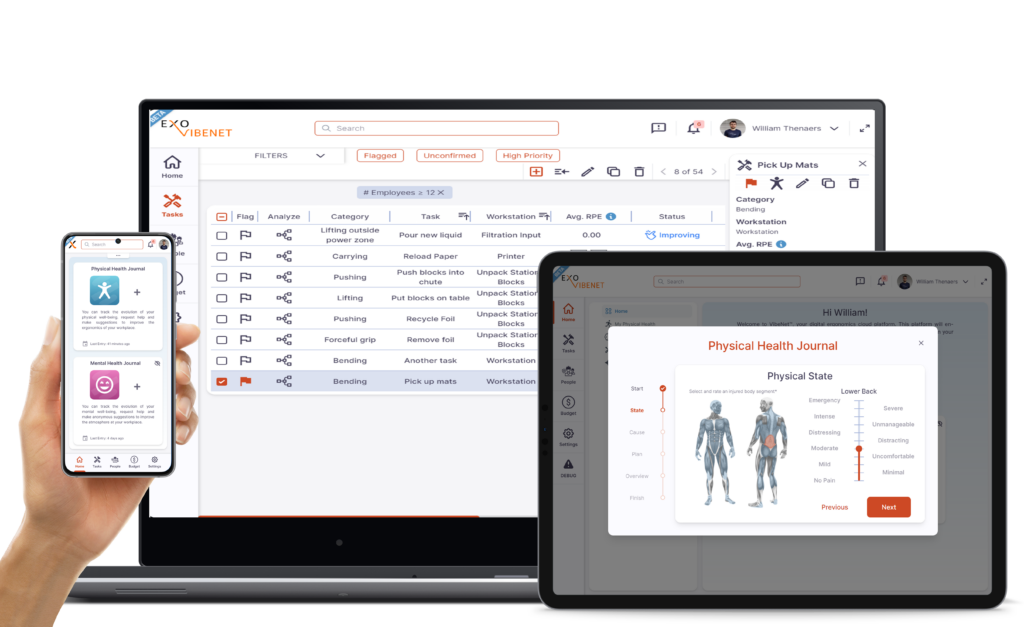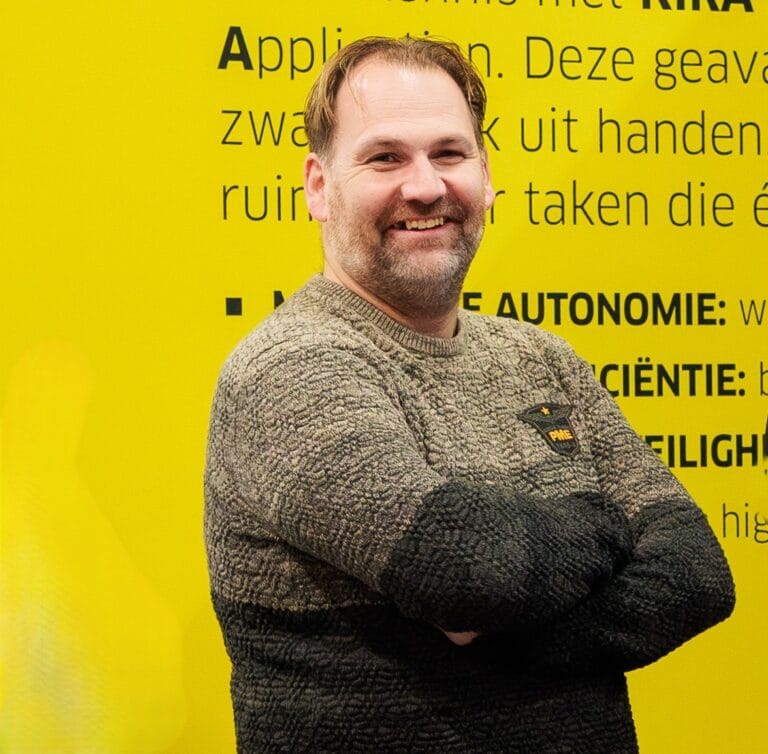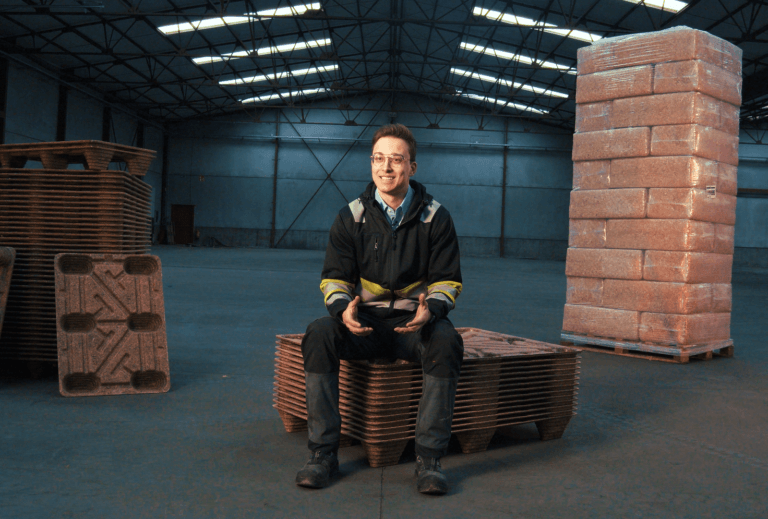Luc Thomas (ExoVibe): ‘The VibeNet platform is becoming an ecosystem of applications around ergonomics and safety’

One of Log!Ville’s partners is the Hasselt-based start-up ExoVibe. Originally, it focussed on an exoskeleton with artificial muscles but, after input from American ‘mentor’ The Alchemist Accelerator, the emphasis now lies on VibeNet, a cloud-based platform with various applications for improving ergonomics and safety in logistics (among other things). CEO Luc Thomas offers more information.
The start of ExoVibe dates back to a project in 2014. Gabriel Samlali took a heavy box to the attic and realised that this process would be impossible for an elderly person. He then began looking for a solution and encountered exoskeletons for the first time. He quickly found out that these were already being used in the medical sector, in industrial applications and the military but that they had all been designed for specific tasks, such as lifting, working crouched down, and so on. So, he came up with the idea of an exoskeleton that could be used much more broadly.
‘He developed his prototype together with William Thenaers, a fellow ICT-Electronics student at the PXL Hogeschool in Hasselt at the time. Gabriel focussed on the concept and William concentrated on the embedded systems. Along the way, they were offered an opportunity to continue their work at the Corda Campus but could not find any investors. At that time, I was working on the Campus with a start-up in the energy sector and, at the end of 2018, I decided to become their ‘business angel’. Jöry Pauwels, an osteopath who recognised the many opportunities in the project, then joined them as the second angel,’ explains Luc Thomas.
Along with a fifth partner, production adviser Yoeri Renders, ExoVibe was founded as a business in April 2019. The development focussed on three complementary products. The first was VibeOne, a soft pneumatically activated exoskeleton with ‘artificial muscles’ for which ExoVibe has a patent. The focus here was the energy and the control system, on the one hand, and the self-developed artificial muscles, on the other. The second was VibeSense, a set of wearable sensors which records movements accurately in order to register data about processes. Then there is VibeNet, a cloud-based digital platform for analysing this movement data and automating ergonomic risk assessments.
The latter was crucial for the development of the two other products because the classification of the movements was an essential element. ‘Together with people in logistics, we researched this classification and we were able to establish 380 micro-movements that could be separated from each other. Parallel to this, we worked on an updated pneumatic and more energy-efficient system for the artificial muscles,’ he adds.
The Alchemist Accelerator steps in
At the end of 2020, ExoVibe came into contact with ‘The Alchemist Accelerator’, an American network supported by venture capital that focuses on accelerating the development of start-ups worldwide, with the concept of ‘mentorship’ playing a great role. ‘They advised us that we were on the wrong path, with our three different developments, and that we were not focussed enough. They told us to concentrate on the cloud platform and only then to look at applications such as exoskeletons and artificial muscles. These were placed on hold as a result,’ explains Luc Thomas.
‘Tech-enabled’ consultancy
This change of tack resulted in the platform becoming more holistic in terms of ergonomics, rather than focusing on the exoskeleton. ‘We had to get back to the issues that we had originally wanted to tackle: preventing physical issues, increasing productivity, and improving retention and well-being in the workplace. The first step was developing an app for preventing ergonomic incidents that could be used by employees to report physical complaints and make suggestions in terms of well-being, and by prevention advisers to screen ergonomic risks. The second step was drawing up an inventory of jobs and physical activities and establishing the corresponding ergonomic problems based on complaints and risks. The third step was establishing priorities about a job improvement process, focussing on problem areas, possible solutions and ROI calculations,’ he adds.
This, in turn, led to the development of an updated VibeNet platform, the beta version of which was presented a year ago. ‘Now, the package is much more rounded and commercialisation can begin. It should also be noted, that although some EHS (Environment, Health and Safety) teams within businesses, including the logistics sector, have had less than satisfactory experiences with software for improving ergonomics on the work floor, they did have shown an interest in ‘tech-enabled’ consultancy. As a result, ExoVibe profiles itself as an ergonomics consultant which uses the platform as an instrument for analysis and inventory. At the moment, we are preparing for the platform’s launch with our first three customers,’ explains Luc Thomas.

An ecosystem of various apps
In parallel, the team is also working on complementary apps. ‘We envisage the development of an ecosystem of various, interconnected applications on one platform. This ecosystem could be quite broad and may include asset management, for example, where measurements are proposed to make a workstation safer and more ergonomic. This could then evolve into a marketplace app where vendors offer adapted products and solutions or a specific HR app,’ Thomas adds. ‘The platform is scalable, as we work with the cloud and a Software as a Service business model and this ensures a good price/quality ratio.’
According to Thomas, VibeNet will be developed quite quickly. ‘Once the platform with various applications has been created, we can connect the movement and health sensors and pick up the exoskeleton and artificial muscles projects again. We hope to do this within five years so we can bring these solutions to the market by 2030,’ he adds.
Cross-pollination at Log!Ville
‘At Log!Ville, we are only presenting VibeNet. We use a demonstration to show that, despite its complexity, the platform is very simple to use. We focus on the ergonomics application, which could be highly beneficial in logistics for the prevention of physical complaints. We are also one of the partners in the themed tour which concentrates on ergonomics and safety at Log!Ville,’ explains Luc Thomas.
‘As a start-up, it is difficult to attract the right people and companies but, thanks to the Innovation Ambassadors at Log!Ville, we have been able to find them. We have already gained a few valuable leads. It is also a location where we can learn a great deal through our contact with other partners,’ he says. ‘There is extensive cross-pollination with the other start-ups which are present at Log!Ville.’ We talk to each other, offer tips, share expertise and support one another. This process will also allow us to evolve more quickly.’



